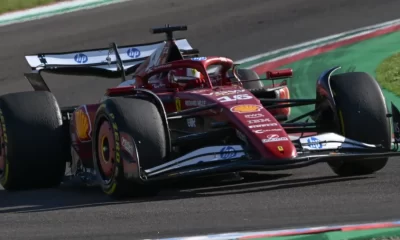Travel
Spanish cruise holiday warning as guests told ‘all-inclusive’ drinks will be taxed
Norwegian Cruise Line’s ‘Free at Sea’ drinks deal comes with a catch in Spanish waters.
A cruise ship holiday is the height of luxury; a time to sit back and have all your needs and travel yearnings met on one giant vessel.
So passengers on Norwegian Cruise Line’s Spanish trips have been outraged to find that their all-inclusive package contains a catch.
Guests who have paid hundreds of euros for NCL’s ‘Free at Sea’ offer – which covers limitless drinks and WiFi – are now discovering that they will have to pay tax on the drinks while in Spain.
Why does the all-inclusive drinks package come with a drink cost?
Spain charges 10 per cent in VAT on food and drink consumed on land – and, it turns out, water.
So NCL is essentially passing that cost onto passengers, following a policy change in spring 2023.
“We were advised with the beginning of our Europe season earlier this year that guests will be charged additional VAT on certain sailings,” a spokesperson for NCL told UK news site The Independent, which has heard exclusively from disgruntled passengers.
The VAT charge applies to those beginning their voyages at ports in Spain or sailing through Spanish territorial waters. Every drink incurs the 10 per cent in VAT charge.
For Stephen Donoghue of Newcastle, who has just set sail from Bilbao on NCL with his wife, that’s unacceptable. He described it to The Independent as “the latest attempt to extract more money from me by effectively making me pay twice for the same thing”.
A key complaint from passengers is that the policy was only made clear to them after they had bought their packages.
The package typically costs £20 (€23) per person per day, with the ‘Free at Sea’ upgrade setting Mr Donoghue and his wife back £249 (€287) each for the duration of their voyage.
“Unless otherwise specified at the time of booking, fares do not include charges imposed by local authorities whilst in port or within territorial waters on goods and services provided on board ship,” the cruise line’s terms and conditions read.
Are cruise ships welcome in Spain?
It has been rough sailing for cruise ships in Spain recently.
As a hugely popular cruise destination, Spanish cities like Barcelona are reappraising their relationship with the enormous vessels; weighing up their benefits against the environmental and social costs.
Barcelona is Europe’s most polluted cruise ship port, according to recent study from Transport & Environment.
To combat exhaust gases and overtourism, the city is banning ships from its northern docks from 22 October this year.
Ships will then be directed to dock further outside the city, meaning passengers will no longer be able to disembark and walk straight to the city’s central street of La Rambla.
Fewer rambling tourists is no bad thing for city residents, who have complained that cruise travellers simply add to crowds rather than contributing to the local economy.
Travel
Brits could soon enjoy shorter passport control queues at EU airports. Here’s why
British holidaymakers will soon be able to use e-gates at more EU airports, the UK government has announced.
It comes as part of negotiations between the UK government and the European Union to finalise a ‘post-Brexit reset deal’.
It means British passport holders will no longer have to wait at manned desks and will instead be allowed to use fast-track e-gates usually reserved for EU or European Economic Area citizens.
EU Relations Minister Nick Thomas-Symonds said this would give British travellers “more time to spend on holiday or work trips […] doing what you want, not being stuck in queues.”
The UK government said the move would end “the dreaded queues at border control.”
UK travellers have to join ‘other nations’ queue at EU airports
Following Brexit, UK citizens forfeited their privileged status when travelling to EU countries.
They now fall into the ‘visa-exempt third-country nationals’ category – the same classification as travellers from dozens of countries, including Australia, Canada, New Zealand and Singapore.
This has meant British travellers must join the ‘other nations’ queue at border control rather than using the expedited EU lanes.
The requirement to check that British travellers meet entry conditions is a significant obstacle to allowing them to use the fast-track lanes.
EU border control has to verify that UK travellers are not in breach of the 90-day stay limit in 180 days and that they have the means to return to their country of origin, i.e. a flight ticket out of the EU.
Frontier officials must also stamp the passenger’s passport.
This change often translates to extended waiting times, especially at busy European airports like Amsterdam Schiphol, Milan Malpensa, and Paris Charles de Gaulle.
Waits exceeding an hour have become commonplace, especially when arriving shortly after large international flights.
These delays affect not only entry into EU countries but also departure, as British travellers must undergo exit checks that sometimes result in missed flights due to lengthy queues.
UK travellers will be able to use e-gates at many European airports
Under the new deal, British travellers will be able to take advantage of the faster e-gate passport checks at many EU airports.
No details have yet been released on when this will be introduced and where, although the BBC reported that British Prime Minister Keir Starmer “has called on all EU members to co-operate without delay.”
Some EU airports will likely allow UK travellers to use existing e-gates reserved for EU citizens, while others may install dedicated ‘third-country national’ e-gates.
The latter are already in place across Italy, including Venice Marco Polo and Rome Fiumicino, as well as at Amsterdam Schiphol and Lisbon.
With this system, once the traveller passes through the gate, there is a brief check by border officials who will also stamp passports.
Brits will use e-gates in all airports after introduction of EES
In addition, the UK government underlined that there will be “no legal barriers to e-gate use for British Nationals travelling to and from European Union Member States after the introduction of the European Union Entry/Exit System [EES].”
The EES is scheduled to come into force in October this year. The system will register non-EU visitors who don’t need a visa digitally, removing the need for physical stamps.
New pet passports will make it easier for Brits to bring pets into EU
The UK government also announced that new pet passports will be introduced as part of the deal.
This means UK cats and dogs will be able to travel “more easily” from the UK into the EU by “eliminating the need for animal health certificates for every trip.”
Travel
Three killed in lightning strike at Cambodia’s Angkor Wat UNESCO temple complex
Three people have been killed and several others injured after they were struck by lightning during a visit to Cambodia’s famous Angkor Wat temple complex.
They group had been seeking shelter around the main temple of the UNESCO site when the lightning strike happened late on Friday afternoon.
Video posted on social media showed two ambulances arriving in the aftermath and onlookers and site officials carrying some of the injured people and helping others out on foot.
Other images showed multiple people being treated in hospital.
The day after the incident, Cambodia’s Minister of Tourism Hout Hak issued a statement telling people to take down online posts about the incident, saying the spreading of “negative information” could harm the country’s tourism sector.
Authorities have released no information about the strike, but an official on Monday, speaking on condition of anonymity due to the sensitivity of the issue, confirmed to the Associated Press that the three people killed were all Cambodian nationals.
The Cambodian Red Cross also posted an update saying it had delivered care packages to the families of two of the victims, a 34-year-old man and a 52-year-old woman.
The Red Cross refused to comment further by phone.
A spokesman for the Angkor Wat site did not respond to requests for comment, nor did a regional health official.
Angkor Wat is Cambodia’s best-known tourist attraction, attracting some 2.5 million visitors annually and is featured prominently on the country’s flag.
UNESCO calls the site, which sprawls across some 400 square kilometres and contains the ruins of Khmer Empire capitals from the 9th to the 15th centuries, one of the most important archaeological sites in Southeast Asia.
Cambodia has been actively developing the area to attract more visitors, including opening a new $1.1 billion (€890 million) Chinese-funded airport in nearby Siem Reap.
Its move to relocate some 10,000 families squatting in the Angkor Wat area to a new settlement has drawn widespread criticism from human rights groups and UNESCO itself has also expressed concern.
Cambodian authorities have said the families are being voluntarily relocated, but Amnesty International and other groups have questioned how voluntary those relocations have been.
Travel
‘Leave them where they belong’: Bruges implores tourists to stop stealing cobblestones
Tourists have been caught smuggling all kinds of stolen souvenirs home from holidays, from artefacts picked up in Pompeii to sand from Italy’s famous pink beach on the island of Sardinia.
The Belgian city of Bruges is the latest victim of keepsake crime, but the item visitors have taken a fancy to is unexpected.
The city council has reported the theft of dozens of cobblestones from the city centre, and suspects tourists are the culprits.
Tourists suspected of pilfering Bruges’ cobblestones
Bruges’ cobblestones are increasingly being pilfered from well-known spots in the UNESCO-designated historic centre, public property councillor Franky Demon reported this week.
“At iconic locations such as Minnewater, Vismarkt, Markt and Gruuthusemuseum, it is estimated that 50 to 70 pieces of cobblestone disappear every month. And that number could be even higher,” Demon told press.
“The phenomenon increases significantly, especially during busy tourist periods such as spring and summer,” he added.
For this reason, authorities suspect visitors are pocketing the stone as souvenirs.
‘Leave that cobblestone where it belongs’
As well as damaging a valuable part of the city’s heritage, the stolen stones have created safety issues.
The gaps from removed stones present trip hazards for pedestrians – and are costly to repair.
“It’s unfortunate that our employees constantly have to go out to fix potholes and loose stones. This causes a lot of additional work and costs: about 200 euros per square metre of reconstruction,” explained Demon.
The councillor urged visitors to respect the historical environment of Bruges.
“We simply ask for respect. Anyone walking through Bruges crosses centuries of history. Leave that cobblestone where it belongs,” he said.
Bruges’ cobblestones are apparently not the only sought-after street souvenir.
Along the famous Paris-Roubaix cycling route, tourists are known to pilfer parts of the pavement.
While Rome’s iconic ‘sampietrini’ – cobblestones made of solidified lava – have also disappeared into suitcases over the years.
-

 EU & the World6 days ago
EU & the World6 days agoWho Is Valeria Marquez? About the Influencer Who Was Shot During Livestream
-

 EU & the World4 days ago
EU & the World4 days agoChris Brown Tour 2025: Updates on Concert Dates, Cities, Ticket Prices & More
-

 EU & the World7 days ago
EU & the World7 days agoCardi B & Offset’s Relationship Timeline: From Marriage To Cheating Drama & Split
-

 EU & the World5 days ago
EU & the World5 days agoWho Is Ben Cohen? About the Ben & Jerry’s Co-Founder Who Was Arrested During Senate Hearing
-

 EU & the World3 days ago
EU & the World3 days agoJosh Freese: 5 Things to Know About the Former Foo Fighters Drummer
-
Travel6 days ago
Crete earthquake: Is it safe to travel to the Greek island following tsunami warning?
-

 EU & the World5 days ago
EU & the World5 days agoChris Brown’s Net Worth: How Much Money He Makes Now
-

 Sports4 days ago
Sports4 days agoFerrari, opposing views after first day at Imola for Charles Leclerc and Lewis Hamilton









